

Search london history from Roman times to modern day
301
To the reign of Henry the Second belongs the only description of London in the twelfth century that we possess. It is, of course, that of FitzStephen. I transcribe it in full; and as this description belongs to the Norman rather than the later Plantagenet period, to the twelfth rather than the thirteenth and fourteenth centuries, I place it in the Book of Norman London.
| Stephanides: Descriptio Nobilissimae Civitatis Londoniae | A Description of the Most Honourable City of London |
| De Situ (Nobilissimae Civitatis London) | The Situation thereof |
| Inter nobiles Urbes Orbis, quas Fama celebrat, Civitas Londonia, Regni Anglorum Sedes, una est quae Famam sui latiùs diffundit, Opes & Merces longiùs transmittit, Caput altiùs extollit: Felix est Aeris Salubritate, Christiana Religione, Firmitate Munitionum, Natura Situs, Honore Civium, Pudicita matronali, Ludis etiam quàm jocunda: & Nobilium est foecunda Virorum: quae singula semotim libet inspicere. | Amongst the noble Cities of the World, honoured by Fame, the City of London is the one principal Seat of the Kingdom of England, whose Renown is spread abroad very far: but she transporteth her Wares and Commodities much farther, and advanceth her Head so much the higher. Happy she is in the Wholesomeness of the Air, in the Christian Religion, her Munition also and Strength, the Nature of her Situation, the Honour of her Citizens, the Chastity of her Matrons: very pleasant also in her Sports and Pastimes, and replenished with honourable Personages: All which I think meet severally to consider. |
| De Clementia Coeli | The Temperateness of the Air |
| Ibi siquidem emollit Animos Hominum Clementia Coeli, non ut sint in Venerem (putres) sed ne feri sint & bestiales, (sed) potius benigni & liberales. | In this Place, the Calmness of the Air doth mollify Men’s Minds, not302 corupting them with venereal Lusts, but preserving them from savage and rude Behaviour, and seasoning their Inclinations with a more kind and free Temper. |
| De (Christiana ibi) Religione | Of the Christian Religion there |
| Est ibi in Ecclesia Beati Pauli Episcopalis Sedes, quondam fuit Metropolitana, & adhuc futura creditur, si remeaverint Cives in Insulam: Nisi forte Beati Thomae Martyris Titulus Archiepiscopalis, & Praesentia corporalis, Dignitatem illam Cantuariae, ubi nunc est, conservet perpetuam. Sed cum utramque Urbium harum Sanctus Thomas illustraverit, Londoniam Ortu, Cantuariam Occasu: Ipsius Sancti Intuitu, cum Justitiae Accessu, habet altera adversus alteram, quod amplius alleget. Sunt etiam, quod ad Christianae Fidei Cultum pertinet, tum in Londonia, tum in Suburbano, tredecem majores Ecclesiae Conventuum, praeter minores Parochianas, centum viginti sex. | There is in the Church of St. Paul a Bishop’s See: It was formerly a Metropolitan, and, as it is thought, shall recover the said Dignity again, if the Citizens shall return back into the Island: except, perhaps, the Archiepiscopal Title of St. Thomas the Martyr, and his bodily Presence, do perpetuate this Honour to Canterbury, where now his Reliques are. But seeing St. Thomas hath graced both these Cities, namely, London with his Birth, and Canterbury with his Death; one Place may alledge more against the other, in Respect of the Sight of that Saint, with the Accession of Holiness. Now, concerning the Worship of God in the Christian Faith: There are in London and in the Suburbs 13 greater Conventual Churches, besides 126 lesser Parish Churches: (139 Churches in all). |
| De Firmitate (& Situ) Urbis | On the Strength and Scite of the City |
| Habet ab Oriente Arcem Palatinam, maximam & fortissimam, cujus & Area & Muri à Fundamento profundissimo exurgunt: Cemento cum Sanguine Animalium temperato. Ab Occidente duo Castella munitissima: Muro Urbis alto & magno duplatis Heptapylae Portis intercontinuante, (Spatio) turrito ab Aquilone per Intercapedines. Similiterque ab Austro Londonia murata & turrita fuit: Sed Fluvius maximus piscosus Thamensis, Mari influo refluoque qui illac allabitur, Moenia illa Tractu Temporis alluit, labefactavit, dejecit. Item sursùm ab Occidente Palatium Regium eminet super Fluvium eundem, Aedificium incomparabile, cum Antemurali & Propugnaculis, duobus Millibus ab Urbe, Surburbano frequenti continuante. | It hath on the east Part a Tower Palatine, very large and very strong, whose Court and Walls rise up from a deep Foundation: The Morter is tempered with the Blood of Beasts. On the West are two Castles well fenced. The Wall of the City is high and great, continued with seven Gates, which are made double, and on the North distinguished with Turrets by303 Spaces. Likewise on the South London hath been enclosed with Walls and Towers, but the large River of Thames, well stored with Fish, and in which the Tide ebbs and flows, by Continuance of Time, hath washed, worn away, and cast down those Walls. Farther, above in the West Part, the King’s Palace is eminently seated upon the River: an Incomparable building, having a wall before it, and some Bulwarks. It is two miles from the City, continued with a suburb full of people. |

MARCH. FIELD WORK
|
|
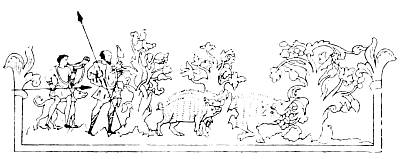
SEPTEMBER. BOAR-HUNTING
From The Old English Calendar (11th cent.), Cotton MS. |
|
| De Hortis (Consitis) | Of the Gardens planted |
| Undique extra Domos suburbanorum Civium Horti Arboribus consiti spatiosi, & speciosi, contigui habentur. | Everywhere without the Houses of the Suburbs, the Citizens have Gardens and Orchards planted with Trees, large, beautiful, and one joining to another. |
| De Pascuis | Of their Pastures |
| Item à Borea sunt Agri Pascui, & Pratorum grata Planities, Aquis Fluvialibus interfluis: Ad quas Molinarum versatiles Rotae citantur cum Murmure jocoso. Proximè patet Foresta ingens, Saltus nemorosi Ferarum, Latebrae Cervorum, Damarum, Aprorum, & Taurorum sylvestrium. | On the north Side are Fields for Pasture, and open Meadows very pleasant: among which the River Waters do flow, and the Wheels of the Mills are turned about with a delightful304 Noise. Very near lieth a large Forest in which are woody Groves of wild Beasts; in the Coverts whereof do lurk Bucks and Does, wild Boars and Bulls. |
| De Agris | Of their Fields |
| Agri Urbis sationales non sunt jejunae Glareae, sed pingues Asiae Campi qui faciunt laetas Segetes, & suorum Cultorum repleant Horrea cerealis Jugere Culmi. | The arable Lands are no hungry pieces of Gravel Ground: but like the rich fields of Asia, which bring plentiful Corn, and fill the barns of those that till them with a dainty Crop of the Fruits of Ceres. |
| De Fontibus | Of their Wells |
| Sunt & circa Londoniam ab Aquilone suburbani Fontes, praecipui Aqua dulci, salubri, perspicua, & per claros Rivo trepidante Lapillos. Inter quos Fons Sacer, Fons Clericorum, Fons Sancti Clementis nominatiores habentur, & adeuntur celebriori Accessu, & majori Frequentia Scholarium & urbanae Juventutis in Serotinis aestivis ad Auram exeuntis. Urbs sanè bona, cùm bonum habeat Dominum. | There are also about London, on the North of the Suburbs, choice Fountains of Water, sweet, wholesome and clear, streaming forth among the glistening Pebble-stones: In this Number, Holy Well, Clerkenwell, and Saint Clement’s Well, are of most Note, and frequented above the rest, when Scholars and Youths of the City take the air abroad in the Summer Evenings. A good city when it hath a good Lord. |
| De Honore Civium | Of the Citizens’ Honour |
| Urbe ista Viris est honorata, Armis decorata, multo Habitatore populosa, ut Tempore bellicae Cladis sub Rege Stephano Bello apti, ex ea exeuntes qui ostentati, haberentur 20,000 Equitum armatos, & 60 mille Peditum aestimarentur. Cives Londoniae ubicunque Locorum prae omnibus aliis Civibus Ornatu Morum, Vestium, & Mensae, Locatione, spectabiles & noti habentur. | This City is honoured with her Men, graced with her Arms, and peopled with a multitude of inhabitants. In the fatal Wars under King Stephen, there went out to a Muster, Men fit for war, esteemed to the Number of 20,000 Horsemen, armed, and 60,000 Footmen. The Citizens of London are known in all places, and respected above all other Citizens, for their civil Demeanour, their good Apparel, their Table, and their Discourse. 305 |
| De (Pudicita) Matronis |
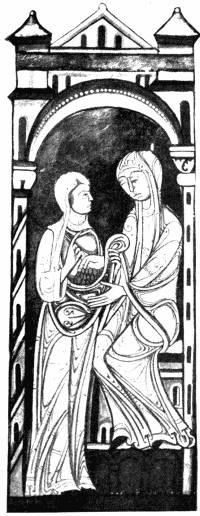
MATRON AND MAID
MS. (12th cent.). |
Of their Chastity, and the Matrons |
| Urbis Matronae ipsae Sabinae sunt. | The Matrons of the City may be parallelled with the Sabine Women. |
| De Scholis | Of their Schools |
| In Londiniis tres principales Ecclesiae: viz. Sedes Episcopalis, Ecclesia S. Martini, Scholas celebres habent & Privilegio & antiqua Dignitate, plerumque tamen Favore personali alicujus vel aliquorum Doctorum, qui secundum Philosophiam noti & praeclari habeantur. Et alii ibi sunt Scholae de Gratia & Permissione. Diebus Festis ad Ecclesias Festivas Magistri cum Discipulis suis Conventus, Gratia Exercitationis, celebrant. Disputant ibidem Scholares, quidam demonstrativè, dialecticè alii: alii recitant Enthymemata: hii meliùs perfectis utuntur Syllogismis. Quidam ad Ostentationem exercentur Disputationem, quae est inter Colluctantes. Alii ad Veritatem, ea quae est Perfectionis Gratia: Sophistae Simulatores Agmine & Inundatione Verborum beati judicantur. Alii paralogizantur: Oratores aliqui quandoque Orationibus rhetoricis aliquid dicunt apposite ad persuadendum, curantes Artis Praecepta servare, & ex Contingentibus nihil omittere. Pueri diversarum Scholarum Versibus inter se convixantur: aut de Principiis Artis Grammaticae, aut de Regulis Praeteritorum vel Futurorum contendunt: Sunt alii, qui, in Epigrammatibus, Rithmis & Metris Fescennina Socios suppressis Nominibus liberius lacerant, Loedorias jaculantur & Scommata, Salibus Socraticis Sociorum, vel forte Majorum Vitia tangunt, ne mordacius Dente rodant procaciori, audacioribus Convitiis Auditores multum videre parati: Ingeminant tremulos Naso crispante Cachinnos. | In London, three famous Schools are kept at three principal Churches, St. Paul’s, the Holy Trinity, and St. Martins: which they retain by Privilege and ancient Dignity: Yet for the most Part, by Favour of Some Persons, or some Teachers, who are known and famed for their Philosophy, there are other schools there, upon Good will and Sufferance. Upon the Holidays, the Masters with their Scholars celebrate Assemblies at the Festival Churches. The Scholars dispute for exercise sake: some use Demonstrations, others topical and probable Arguments: some practise Enthymems, others do better use perfect Syllogisms: some exercise themselves in dispute for ostentation, which is practised among such as strive together for Victory: others dispute for Truth, which is the Grace of Perfection. The Sophisters, which are Dissemblers, turn Verbalists, and are magnified, when they overflow in Speech and Abundance306 of Words: some also are entrapped with deceitful Arguments. Sometimes certain orators, with rhetorical Orations, speak handsomely to persuade, being careful to observe the precepts of Art, who omit no matter Contingent. The Boys of divers Schools wrangle together in versifying, or canvas the principles of Grammar, or dispute the rules of the preterperfect and future Tenses. Some there are that, in Epigrams, Rhymes and Verses use that trivial way of abuse. These do freely quip their Fellows, suppressing their names, with a Fescennine and railing Liberty: These cast out most abusive jests: and, with Socratical witty expressions, they touch the Vices of their Fellows, or perhaps of their Superiors, or fall upon them with a satyrical Bitterness, and with bolder Reproaches than is fit. The hearers, prepared for Laughter, make themselves merry in the mean Time. |
| De Dispositione Urbis | How the Affairs of the City are Disposed |
| Singulorum Officiorum exercitatores, singularum Rerum Venditores, singularum Operarum suarum Locatores, quotidiano Mane per se sunt Locis distincti omnes, ut Officiis. Praeterea est in Londonia supra Ripam Fluminis inter Vina in Navibus, & Cellis vinariis Venalia, publica Coquina: Ibi quotidiè pro Tempore est invenire cibaria Fercula, assa, frixa, elixa, Pisces, Pisciculos, Carnes grossiores Pauperibus, delicatiores Divitibus, Venationum, Avium, Avicularum. Si subitò veniant ad aliquem Civium Amici fatigati ex Itinere, nec libeat jejunus expectare, ut novi Cibi emantur, coquantur, dent Famuli Manibus limphas Panesque, interim ad Ripam curritur, ibi praesto sunt omnia Desiderabilia. Quantalibet Militum vel Peregrinorum Infinitas intrat Urbem qualibet Diei vel Noctis Hora, vel ab Urbe exitura, ne vel hii nimium jejunent, vel alii impransi exeant, illuc si placeat divertunt, & se pro Modo suo singuli reficiunt: Qui se curare volunt molliter, accipiunt Anserem, ne Affricam Avem vel Attagen Ionicum non opus ut quis quaerant, appositis quae ibi inveniuntur Deliciis: Haec equidem publica Coquina est & Civilitati plurimum expediens, & ad Civilitatem pertinens: Hinc est quod legitur in Gorgia Platonis, juxta Medicinam esse Coquorum Officium, Simulachrum, & Adulationem quartae Particulae Civitatis. | The several Craftsmen, the several Sellers of Wares, and Workmen for Hire, all are distinguished every Morning by themselves, in their places as well as Trades. Besides, there is in London upon the River’s Bank a public Place of Cookery, among the Wines to be sold in the shops, and in the Wine Cellars. There every day you may call for any dish of Meat, roast, fryed or sodden: Fish both small and great: ordinary Flesh for the poorer Sort, and more dainty for the Rich as Venison and Fowl. If Friends come upon a307 sudden, wearied with Travel, to a Citizen’s House and they are loth to wait for curious preparations and dressings for Fresh Meat: let the servants give them water to wash, and Bread to stay their Stomach, and, in the mean time, they run to the water side, where all things that can be desired are at hand. Whatsoever multitude of Soldiers, or other Strangers, enter into the City, at any Hour of the Day or Night or else are about to depart: they may turn in, bate here, refresh themselves to their Content, and so avoid long Fasting and not go away without their dinner. If any desire to fit their dainty tooth, they take a Goose: they need not to long for the Fowl of Africa, no, nor the rare Godwit of Ionia. This is the publick Cookery, and very convenient for the State of a City, and belongs to it. Hence it is, we read in Plato’s Gorgias, that next to the Physician’s Art is the Trade of Cooks, the Image and Flattery of the fourth part of a City. |
| De Smithfield | Of Smithfield |
| Est ibi extra unam Portarum statim in Suburbio quidam planus Campus Re & Nomine. Omni sexta Feria nisi sit major Festivitas praeceptae Solemnitatis, est ibi celebre Spectaculum Nobilium Equorum venalium. Spectaturi vel empturi veniunt, qui in Urbe assunt, Comites, Barones, Milites, Cives plurimi. Juvat videre Gradarios Succussatura nitente suaviter ambulantes: Pedibus lateraliter simul erectis quasi a subalternis & demissis: Hinc Equos, qui Armigeris magis conveniunt, durius incendentes, sed expedite tamen, qui quasi a Contradictoribus Pedes simul elevant, & deponunt: Hinc nobiles Pullos juniores, qui nondum Fraeno bene assueti, altius incedunt mollis Crura reponunt: Hinc summarios Membris validis & vegetis. Hinc dextrarios preciosos, elegantis Formae, Staturae honestae, micantes Auribus, Cervicibus arduis, Clunibus obesis. In horum Incessu spectant Emptores, primo Passum suaviorem, postea Motum citatiorem, qui est quasi à contrariis Pedibus anterioribus simul Solo amotis & admotis, & posterioribus similiter. Cum talium Sonipedum Cursus immineat, & aliorum forte qui similiter sunt in Genere suo ad Vecturam validi, ad Cursuram vegeti: Clamor attollitur, vulgares Equos in Partem ire praecipitur: Sessores Alipedum Pueri: Tres simul, aliquando bini Certamini se praeparant, docti Equis imperare, indomitorum lupatis temperant Fraenis Ora: hoc maximè praecaverit ne alter alteri Cursum praecipiat. Equi similiter pro Modo suo ad Certamen Cursus illius se attollunt: tremunt Artus, Morae impatientes, stare Loco nesciunt, facto Signo Membra extendunt, Cursum rapiunt, Agilitate pervicaci feruntur: Certant sessores Laudis Amore, Spe Victoriae Equis admissis subdere Calcaria, & nec minus urgere eos Virgis & ciere Clamoribus. Putares omnia in Motu esse, secundum Heraclitum, & salsam omnino Zenonis Sententiam, dicentis, quoniam, non continget moveri, neque Stadium pertransire. Parte alia stant seorsim Rusticorum Peculia, Agrorum Instrumenta, Sues longis Lateribus, Vaccae distentis Uberibus, Corpora magna Boum, lanigerumque Pecus: Stant ibi aptae Aratris, Trahis & Bigis Equae: quarundam Ventres Foetibus protument: alias, editi Foetus obeunt Pulli lasciviores, Sequela inseparabilis. | Without one of the Gates is a certain Field plain (or smooth) both in Name and Situation. Every Friday, except some greater Festival come in the way, there is a brave sight of gallant Horses to be sold: Many come out of the City to buy or look on, to wit, Earls, Barons, and Knights, Citizens, all resorting thither. It is a pleasant Sight there to behold the Nags well fleshed, sleik and shining, delightfully walking, and their Feet on either Side up and down together by turns: or also trotting308 Horses, which are more convenient for Men that bear Arms: these, although they set a little harder, go away readily, and lift up and set down together the contrary Feet on either Side. Here are also young Colts of a good Breed, that have not been well accustomed to the bridle: these fling about, and by mounting bravely, shew their mettle. Here are the principal Horses, strong and well limbed. Here also are Brest Horses, (fit to be joined by couples) very fair and handsome, and sleek about the Ears, carrying their Necks aloft, being well fleshed, and round about the309 Buttocks. The Buyers first look at their soft and slow pace, and after cause them to put on with more speed, and behold them in their Gallop. When these Coursers are ready to run their Race, and perhaps some others, which in their kind are both good for carriage and strong for Travel: The People give a Shout, and the Common Hacknies are commanded to go aside. They that ride are Boys: three together, and sometimes two make matches among themselves, being expert in governing their Horses, which they ride with Curb Bridles, labouring by all Means that one get not the race from the Other. And the very Beasts, in like Manner, after their Fashion, are eager for the Race, while their Joints tremble, and impatient of Delay, endure not Standing still in a Place. When the Token is given, they stretch out their Limbs, and run with all Activity and Speed: the Riders spurring them on, for the love of Praise or the hope of Victory: and exciting them by whips and cries. You would think everything were in motion with Heraclitus: and Zeno’s Opinion to be false, saying that nothing moves from place to place. In another part stand the Country People with Cattle and Commodities of the Field, large Swine and Kine with their Udders strutting out, fair-bodied Oxen, and the woolly flock. There are also Cart-Horses, fit for the Dray, the Plough, or the Chariot: and some Mares big with Foal: together with others that have their wanton colts following them close at their Side. 310 |
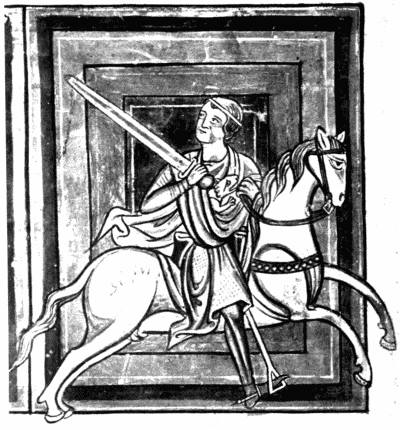
A 13th century HORSEMAN
Harl. MS., 4751 (13th cent.). |
|
| De Navibus & Mercimoniis | Concerning Shipping and Merchandise |
| Ad hanc Urbem, ex omni Natione quae sub Coelo est, navalia gaudent Institores habere Commercia. Aurum mittit Arabs, Species & Thura Sabaeus, Arma Scythes, Oleum Palmarum divite Silva. Pingue Solum Babylon, Nilus Lapides preciosos. Seres purpureas Vestes. Norwegi, Russi, varium Grisium, Sabelinas. Galli sua Vina. | To this City Merchants bring in Wares by Ships from every Nation under Heaven. The Arabian sends his Gold, the Sabean his frankincense and Spices, the Scythian Arms: Oil of Palms from the plentiful Wood: Babylon her fat soil, and Nilus his precious Stones: the Seres send purple Garments: they of Norway and Russia, Trouts, Furs, and Sables: and the French their Wines. |
| De Antiquitate & Politia | Its Antiquity and Government |
| Urbe Roma secundum Chronicorum Fidem satis antiquior est. Ab eisdem quippe Patribus Trojanis haec prius à Bruto condita est, quam illa à Remo & Romulo. Unde & adhuc antiquis eisdem utitur Legibus communibus Institutis. Haec similiter illis Regionibus est distincta: Habet annuos pro Consulibus Vicecomites: habet senatoriam Dignitatem & Magistratus minores: Eluviones & Aquaeductus in Vicis: Ad Genera Causarum deliberativae, demonstrativae, judiciales Loca sua, Fora singula: habet sua Diebus statutis Comitia. | According to the Report of Chronicles, it is more ancient than the City of Rome: For, both being descended from the same Trojan Stock, Brute built this, before Remus and Romulus did the other. Whence still it useth the same ancient Laws and common Institutions. For this our City, like to that, is distinguished by Wards and several Limits: it hath Sheriffs every year, answerable to their Consuls: it hath Aldermen enjoying the dignity of Senators, besides inferior Magistrates: it hath also common Sewers, and conveyances for Water in the Streets. Concerning Causes in Question, there are several Places and Courts for Causes deliberative, demonstrative, and judicial: Upon their set Days also they have their Common-council and great Assemblies. |
| De Consuetudinibus Ecclesiarum | Of the Customs of the Churches |
| Non puto Urbem esse, in qua sint probabiliores Consuetudines in Ecclesiis visitandis, Ordinatis Dei honorandis, Festis feriandis, Eleemosynis dandis, in Hospitibus suscipiendis, in Desponsationibus firmandis, Matrimoniis contrahendis, Nuptiis celebrandis, Conviis ornandis, Convivis hilarandis, etiam in Exequiis curandis & Cadaveribus humandis. | I think there is no City that hath more approved Customs, for frequent311ing the Churches, for honouring God’s Ordinances, observing of Holidays, giving Alms, entertaining Strangers, Confirmation of Contracts, making up and celebrating of Marriages, setting out of Feasts, welcoming the Guests, and, moreover, in Funeral Rites, and burying of the Dead. |
| Pestes Civitatis | The Pests of London |
| Solae Pestes Londini sunt, immoderata Stultorum Potatio, & frequens Incendium. | The only Plagues of London are immoderate drinking of idle Fellows, and often Fires. |
| Frequentia Nobilium | Frequented by Nobles |
| Ad haec, omnes ferè Episcopi, Abbates, & Magnates Angliae, quasi Cives & Municipes sunt Urbis Londoniae: Sua ibi habentes Aedificia praeclara, ubi se recipiunt, ubi Divites Impensas faciunt, ad Consilia, ad Conventus celebres in Urbem evocati, à Domino Rege, vel Metropolitano suo, seu propriis tracti Negotiis. | Moreover, almost all Bishops, Abbots, and Noblemen of England are, as it were, Citizens and Freemen of London. There they have fair dwellings, and thither they do often resort, and lay out a great deal of Money: and are called into the City to Consultations and solemn Meetings, either by the king, or their Metropolitan, or drawn by their own business. |
| De Ludis | Of Sports and Pastimes |
| Amplius, & ad Ludos Urbis veniamus,
quoniam non expedit utilem tantum &
feriam Urbem esse, nisi dulcis etiam sit
& jocunda. Unde & in Sigillis summorum
Pontificum, usque ad Tempora
Leonis Papae, ex altera Parte Bullae,
sculpto per Impressionem Piscatore
Petro, & supra eum Clave quasi Manu
de Coelis ei porrecta, & circa eum Versu,
Tu pro me Navem liquisti, suscipe Clavem.
Nocte pluit tota, redeunt Spectacula mane,
Divisum Imperium cum Jove Cæsar habes.
|
Let us also come at last to their
Sports and Exercises: For it is
expedient that a City be not only
commodious for Gain, and serious in
Business, but also pleasant and delightful.
Therefore, to the time of Pope
Leo, the Popes gave in their seals, on
one side of their Bull, St. Peter like a
Fisherman, and over him a Key reached
forth to him, as it were from Heaven,312
by the hand of God, and this Verse
about it:
For me Thy Ship thou didst forsake,
Therefore the Key of Heaven take.
All night the Sky distils down watry Showers,
The Morning clears again to show the Play:
Great Jove and Cæsar have their several hours,
And in this Universe by turns bear Sway.
|
| De Repraesentatione Miraculorum | Representation of Miracles |
| Londonia pro Spectaculis theatralibus, pro Ludis scenicis, Ludos habet sanctiores, Repraesentationes Miraculorum, quae sancti Confessores operati sunt, seu Repraesentationes Passionum, quibus claruit Constantia Martyrum. | London, instead of common Interludes belonging to the Theatre, hath Plays of a more Holy Subject: Representations of those Miracles which the holy Confessors wrought, or of the Sufferings wherein the glorious constancy of Martyrs did appear. |
| De Pugna Gallorum & Ludo Pilae | Of Cock-fighting and Ball |
| Praeterea quotannis Die, quae dicitur Carnivalia, ut a Puerorum Ludis incipiamus, omnes enim Pueri fuimus, Scholarum singuli Pueri suos apportant Magistro suo Gallos gallinaceos Pugnatores & totum illud Antemeridianum datur Ludo Puerorum vacantium, spectare in Scholis suorum Pugnas Gallorum. Post Prandium exit in Campos omnis Juventus Urbis, ad Ludum Pilae celebrem. Singulorum Studiorum Scholares suam habent Pilam: singulorum Officiorum Urbis Exercitatiores suam singuli Pilam in Manibus. Majores Natu Patres, & Divites Urbis in Equis spectatum veniunt Certamina Juniorum, & Modo suo inveniuntur cum Juvenibus, & excitari videtur in eis Motus Caloris naturalis, Contemplatione tanti Motus & Participatione Gaudiorum Adolescentiae liberioris. | Moreover, that we may begin with the Schools of Youth, feeling once we were all Children: Yearly at Shrovetide, the Boys of every School bring fighting cocks to their Masters, and all the Forenoon is spent at School to see these Cocks fight together. After dinner all the Youth of the City goeth to play at Ball in the Fields: the Scholars of every study have their Balls. The Practisers also of all the Trades have every one their Ball in their hands. The ancienter Sort, the Fathers, and the wealthy Citizens, come on Horseback to see the Youngsters contending at their sport, with whom, in a Manner, they participate by Motion: stirring313 their own natural heat in the View of the active Youth, with whose Mirth and Liberty they seem to communicate. |
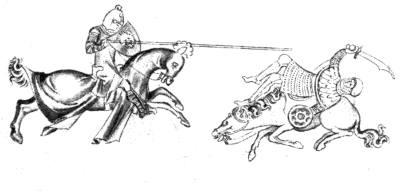
TILTING
Royal MS. 2, B. vii. |
|
| De Ludis bellicosis in Campis | Sports in Lent |
| Singulis Diebus Dominicis in Quadragesima post Prandium exit in Campum Juvenum recens Examen in Equis bellicosis & in Equis Certamine primis: quorum quisque sit aptus in Gyros currere doctus Equo. Erumpunt a Portis catervatim Filii Civium laici, instructi Lanceis & Scutis militaribus: Juniores Hastilibus Ferro dempto praesurcatis, Simulachra Belli cient & agonisticam exercent Militiam. Adveniunt & plurimi Aulici Rege in Vicino prosito & de familiis Consulum & Baronum Ephebi nondum Cingulo donati Militiae Gratia concertandi. Accendit singulos Spes Victoriae: Equi feri adhiniunt, tremunt Artus, Fraenos mandunt, impatientes Morae stare Loco nesciunt. Cum tandem Sonipedum rapuit Ungula Cursum, Sessores Adolescentes divisis Agminibus hii praecedentibus instant, nec assequuntur: hi Socios dijiciunt & praetervolant. | Every Sunday in Lent, after Dinner, a Company of young Men ride out into the Fields on Horses which are fit for War, and principal Runners: Every one among them is taught to run the Rounds with his Horse. The Citizens’ Sons issue out through the gates by Troops, furnished with Lances and warlike Shields: The younger sort have their Pikes not headed with Iron, where they make a representation of Battle, and exercise a skirmish. There resort to this Exercise many Courtiers, when the King lies near Hand, and young Striplings out of the families of Barons and great Persons, which have not yet attained to the warlike Girdle, to train and skirmish. Hope of Victory inflames every one. The neighing and314 fierce Horses bestir their Joints and chew their Bridles, and cannot endure to stand still: At last they begin their Race, and then the young Men divide their troops: some labour to outstrip their leaders, and cannot reach them: others fling down their Fellows and get beyond them. |
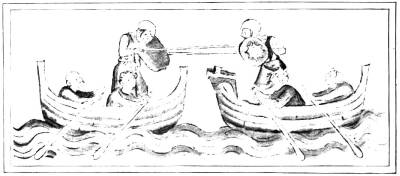
TILTING IN BOATS
Royal MS. 2, B. vii. |
|
| De Ludis Navalibus | Sea Fights |
| In Feris Paschalibus ludunt quasi Praelia navalia: In Arbore siquidem Mediamna Scuto fortiter innexo, Navicula multo Remo & Raptu Fluminis cita, in Prora stantem habet Juvenem, Scutum illum Lancea percussurum: qui, si Scuto illi Lanceam illidens frangat eam, & immotus persistat, habet Propositum, Voti compos est: si vero Lancea integra fortiter percusserit, & per fluentem Amnem dejicietur, Navis Motu suo acta Praeterit. Sunt tamen hinc inde secus duae Naves stationariae, & in eis Juvenes plurimi, ut eripiant Percussorem Flumine absorptum cum primo emersus comparet, vel summa rursus cum bullit in Unda. Supra Pontem & in Solariis supra Fluvium, sunt qui talia spectent, multum rideri parati. | In Easter Holidays they counterfeit a Sea Fight: a Pole is set up in the middle of the River, with a Target well fastened thereon, and a young Man stands in a Boat which is rowed with Oars, and driven on with the Tide, who with his Spear hits the Target in his Passage: with which Blow, if he break the Spear and stand upright, so that he hold Footing, he hath his Desire: but, if his Spear continue unbroken by the Blow, he is tumbled into the Water, and his Boat passeth clear away: But on either side this Target two Ships stand in Ward, with many young Men ready to take him up, after he is sunk, as soon as he appeareth again on the top of the water: The Spectators stand upon the Bridge, and in Solars upon the River to behold these Things, being prepared for Laughter. 315 |
| De Ludis Aestivalibus, ut Lucta & hujusmodi | Summer Sports |
| In Festis tota Aestate Juvenes Ludentes exercentur, in Saliendo, in Arcu, in Lucta, Jactu Lapidum, amentatis Missilibus ultra Metam expediendis, Parmis Duellionum. Puellarum Cytheraea ducit Choros, & Pede libero pulsatur Tellus, usque imminente Luna. | Upon the Holidays all Summer, the Youth is exercised in leaping, Shooting, Wrestling, casting of Stones, and throwing of Javelins fitted with Loops for the Purpose, which they strive to fling beyond the mark: they also use Bucklers, like fighting Men. As for the Maidens, they have their exercise of dancing and tripping until Moonlight. |
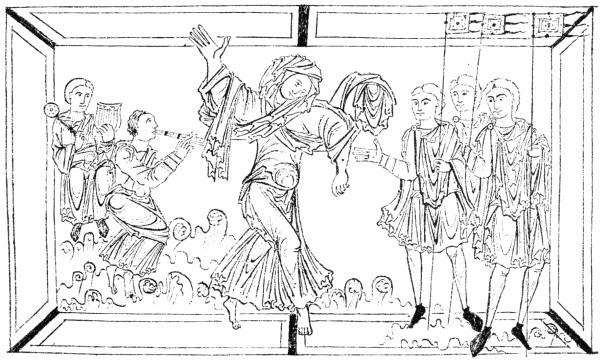
11th century DANCING
Prudentius MS., 24199 (11th cent.). |
|
| De Pugna Aprorum, Taurorum, & Ursorum | Fighting of Boars, Bulls and Bears |
| In Hyeme singulis fere Festis ante Prandium, vel Apri spumantes pugnant pro Capitibus & Verres fulmineis accincti Dentibus addendi Succidiae, vel pingues Tauri cornupetae, seu Ursi immanes cum objectis depugnant Canibus. | In Winter almost every holiday before Dinner, the foaming Boars fight for their heads, and prepare with deadly Tushes to be made Bacon: or else some lusty Bulls, or huge Bears are baited with Dogs. 316 |
| De Ludentibus supra Glaciem | Sport upon the Ice |
| Cùm est congelata Palus illa magna quae Moenia Urbis aquilonia alluit, exeunt lusum super Glaciem densae Juvenum Turmae: Hii ex Cursu Motu captato citatiore, Distantia Pedum posita, magnum Spatium Latere altero praetenso perlabuntur. Alii quasi magnos Lapides molares de Glacie Sedes sibi faciunt: Sessorem unum trahunt plurimi praecurrentes, Manibus se tenentes: in tanta Citatione Motus aliqui Pedibus lapsi cadunt omnes proni. Sunt alii super Glaciem ludere doctiores, singuli Pedibus suis aptantes, & sub Talaribus suis alligantes Ossa, Tibias scilicet Animalium & Palos Ferro acuto subposito tenentes in Manibus, quos aliquando Glaciei illidunt: tanta Rapacitate feruntur, quanta Avis volans, vel Pilum Balistae. Interdum autem magna procul Distantia ex Condicto, duo aliqui ita ab oppositis veniunt, curritur: Palos erigunt, se invicem percutiunt: vel alter, vel ambo cadunt, non sine Laesione corporali, cùm post Casum etiam Vi Motus feruntur ab invicem procul: &, qua Parte Glacies Caput tangit, totum radit, totum decorticat. Plerumque Tibia cadentis, vel Brachium, si super illud ceciderit, confringitur. Sed Aetas avida Gloriae, Juventus cupida Victoriae, ut in veris Praeliis fortius se habeat, ita in simulatis exercetur. | When that great Moor, which washeth Moorfields, at the North Wall of the City, is frozen over, great Companies of Young Men go to sport upon the Ice: then fetching a Run, and setting their feet at a distance, and placing their Bodies sideways they slide a great Way. Others take heaps of Ice, as if it were great Millstones and make Seats: Many going before, draw him that sits thereon, holding one another by the Hand: in going so fast, some slipping with their feet all fall down together, some are better practised to the Ice and bind to their shoes Bones as the Legs of some Beasts, and hold Stakes in their hands headed with sharp Iron, which sometimes they strike against the Ice: and these Men go on with Speed as doth a bird in the air, or darts shot from some warlike Engine: sometimes two Men set themselves at a Distance and run one against another as it were at Tilt, with these Stakes wherewith one or both parties are thrown down, not without some hurt to their Bodies: and after their fall, by reason of the violent Motion are carried a good distance one from another: and wheresoever the Ice doth touch their head it rubs off all the skin and lays it bare: and if one fall upon his leg or arm it is usually broken: But young Men being greedy of honour and desirous of Victory, do thus exercise themselves in Counterfeit Battles, that they may bear the Brunt more strongly, when they came to it in good Earnest. 317 |
| De hiis qui delectantur in Avibus | Sport with Birds and Dogs |
| Plurimi Civium delectantur ludentes in Avibus Coeli, Nisis, Accipitribus, & hujusmodi, & in Canibus militantibus in Silvis. Habentque Cives suum Jus Venandi in Middlesexia, Hertfordseira & tota Chiltra, & in Cantia, usque ad Aquam Craiae. | Many citizens take delight in Birds, as Sparrow-hawks, Goss-hawks, and such-like, and in Dogs to hunt in the woody ground. The Citizens have authority to hunt in Middlesex, Hertfordshire, all the Chilterns, and in Kent, as far as Gray-water. |
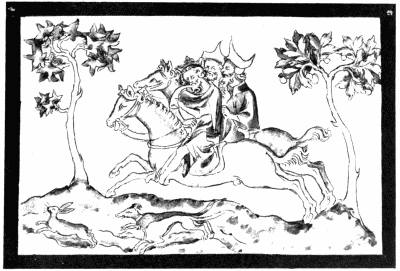
THE CHASE
Royal MS. 2, B. vii. |
|
| Virtus Londonensium | The Valour of Londoners |
| Londonienses, tunc Trinovantes dicti
Caium Julium Cæsarem qui nullas nisi
Sanguine fuso Vias habere gaudebat,
repulerunt. Unde Lucanus, Territa quaesitis ostendit Terga Britannis.
|
The Londoners once called Trinovants,
repulsed C. Julius Cæsar who
commonly paved his way with blood:
whereupon Lucan: He was afraid and foil’d by Briton’s Hand,
That first presumed to invade their Land.
|
| De hiis quos Civitas London peperit | Natives of London |
| Civitas Londonia peperit aliquos, qui
Regna plurima & Romanum sibi subdiderunt
Imperium: & plurimos alios,
quos Mundi Dominos Virtus evexit ad
Deos, ut fuerat, in Appollinis Oraculo,
Bruto promissum: Brute, sub occasu Solis, trans Galliae Regna,
Insula in Oceano est undique clausa Mari:
Hanc pete: namque tibi Sedes erit illa perennis,
Haec fiet Natis altera Troja tuis.
Hic de Stirpe tua Reges nascentur, & ipsis
Totius Terrae subditus Orbis erit.
|
The City of London hath brought
forth some who have subdued many
kingdoms, and the Empire of Rome
to themselves: and many others who318
being Lords of this World were deified
in another: as Apollo’s oracle did
promise Brute: Brute, thou shalt find an Island in the West,
Beyond the Gauls, environ’d with the Main;
Direct thy journey thither for thy Rest,
And there a second Troy shall rise again.
Kings from thy Heirs and Conquerors shall spring,
Who will the World into subjection bring.
|
In connection with this important document certain notes are necessary. There were, FitzStephen says, thirteen larger conventual churches and 126 lesser parish churches. The thirteen conventual churches were, one supposes, St. Paul’s, to which was attached a college of Priests, St. Martin’s le Grand, The Priory of the Holy Trinity, St. Mary Overies, the Hospital of St. Katherine by the Tower, the Priory of St. Bartholomew, the Priory of St. John, the Nunnery of Clerkenwell, the Hospital of St. James, St. Mary Spital, the Hospital of St. Thomas of Acon, the Hospital of St. Giles, and the Abbey of Bermondsey. It is possible, however, that his list did not include houses so far from London as St. Giles, St. James, and319 Bermondsey. It certainly did not include Westminster Abbey. The number of parish churches indicates that the City was now completely divided into parishes. Little change, if any, was made in the City parishes from the time of the Confessor till the Great Fire. After this many of the old parish churches were not rebuilt; and at the present day we continually witness a ruthless destruction of old churches and old associations. We have already tried to get some idea of the number of the inhabitants from other sources; we may try again by considering the number of the churches. Every man in the City belonged of course to his parish church; every man was compelled to obey the Church, to fast on fast days, and to attend mass regularly on Sundays and holy days. If we allow 800 souls only, men, women, and children, for each church, we have a total of 108,200. And this, subject to oscillations caused by losses from plague or from war, sometimes as much as320 100,000, and sometimes dropping to 50,000, I take to have been the average population of London for many centuries.
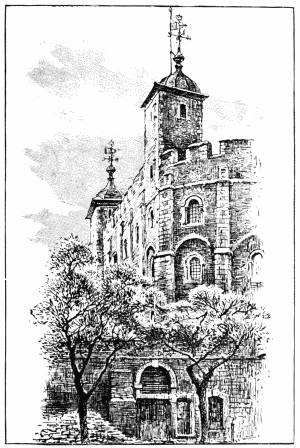
FitzStephen’s “Palatine” Tower is the White Tower, and the other two towers are Baynard’s Castle and Montfichet, both built near the junction of the Fleet with the Thames. FitzStephen speaks with pardonable exaggeration of the northern fields, which were still undrained and covered with bog and quagmire. The “tillage fields” were those belonging to the monks of Westminster south of Holborn and Oxford Street. The seven gates were those of Aldgate, Bishopsgate, Cripplegate, Aldersgate, Newgate, Ludgate, and Bridgegate. Note that the river-side wall by this time had disappeared; it had either fallen down or been taken down. The foundations have been partially uncovered in modern times. The river wall became practically useless after the erection of the Tower and the spread of warehouses along the bank. The bridge could be used to prevent the passage of ships under the arches, so that the upper part of the river was safe, while the Tower might be trusted to defend the small part of the town below the bridge, which, besides, could only be approached by the narrow stairs or the quays.
“The artisans of the several crafts, the vendors of the various commodities, and the labourers of every kind, have each their separate stations which they take every morning.” This shows that the people exposed their wares and carried on their industries in certain assigned spots. Here they had their selds, which were large sheds protected from the weather, in which the things were exposed for sale. A modern fruit-market is a seld; formerly there were selds for everything, and the seld might be a single shanty or it might be a great market like Leadenhall. The names of the modern streets preserve the memory of these selds. Honey Lane, Milk Street, Soper’s (Soaper’s) Lane, Wood Street, The Poultry, Friday Street (where food proper for Friday was sold) and so forth. FitzStephen affords a pleasant glimpse of a busy and prosperous city. Would that the writer had gone into a little more detail! As it is we are thankful for what we get: we could not spare one word of what is written.
And he tells us so much in a few words. What, for instance, can be more complete and more suggestive to the imagination than his description of the London matrons in one word, pithy and full of meaning? They are “Sabines!”—“Sabinae sunt!”
Trying to avoid privacy and cookie settings overwriting content